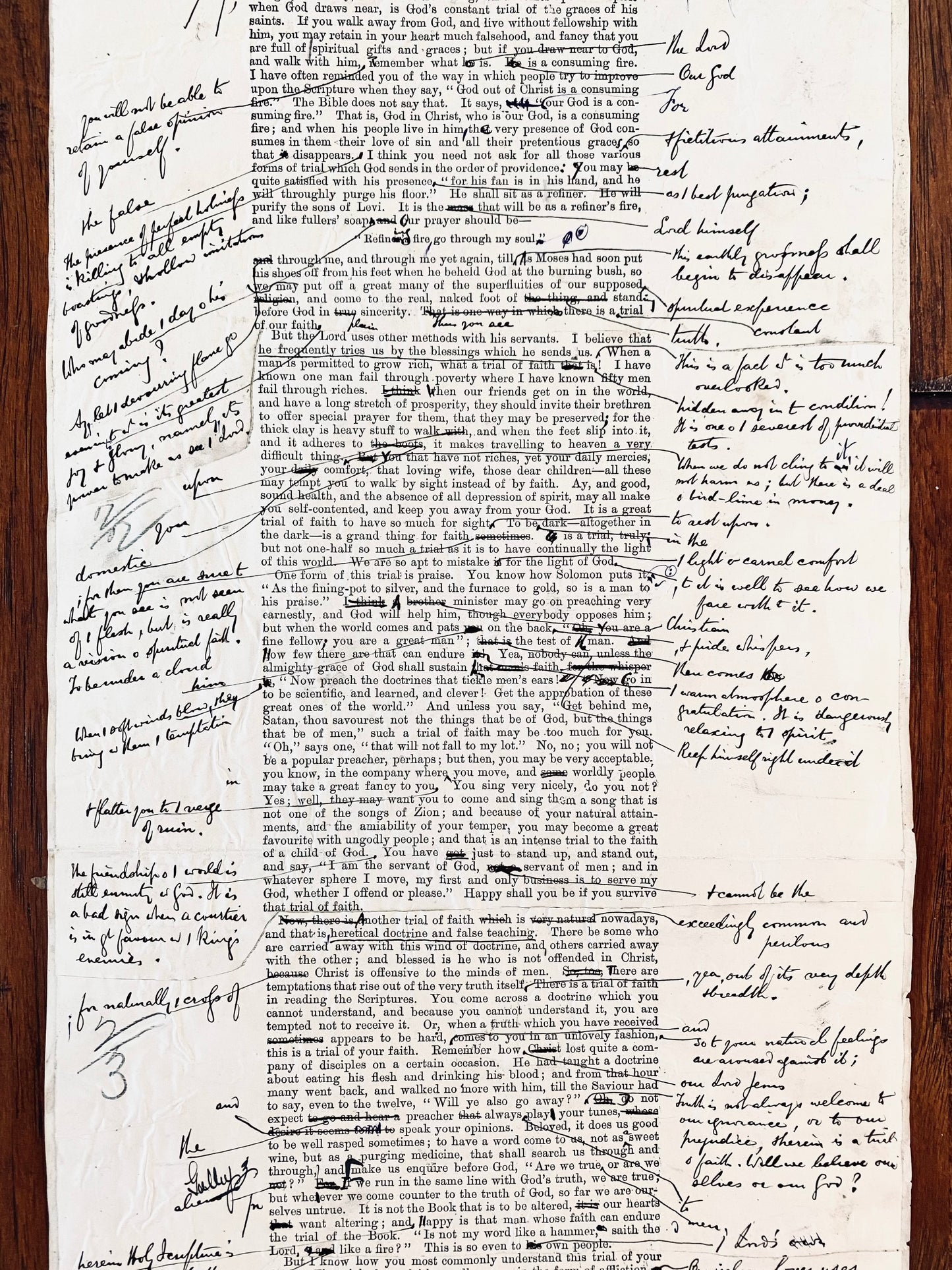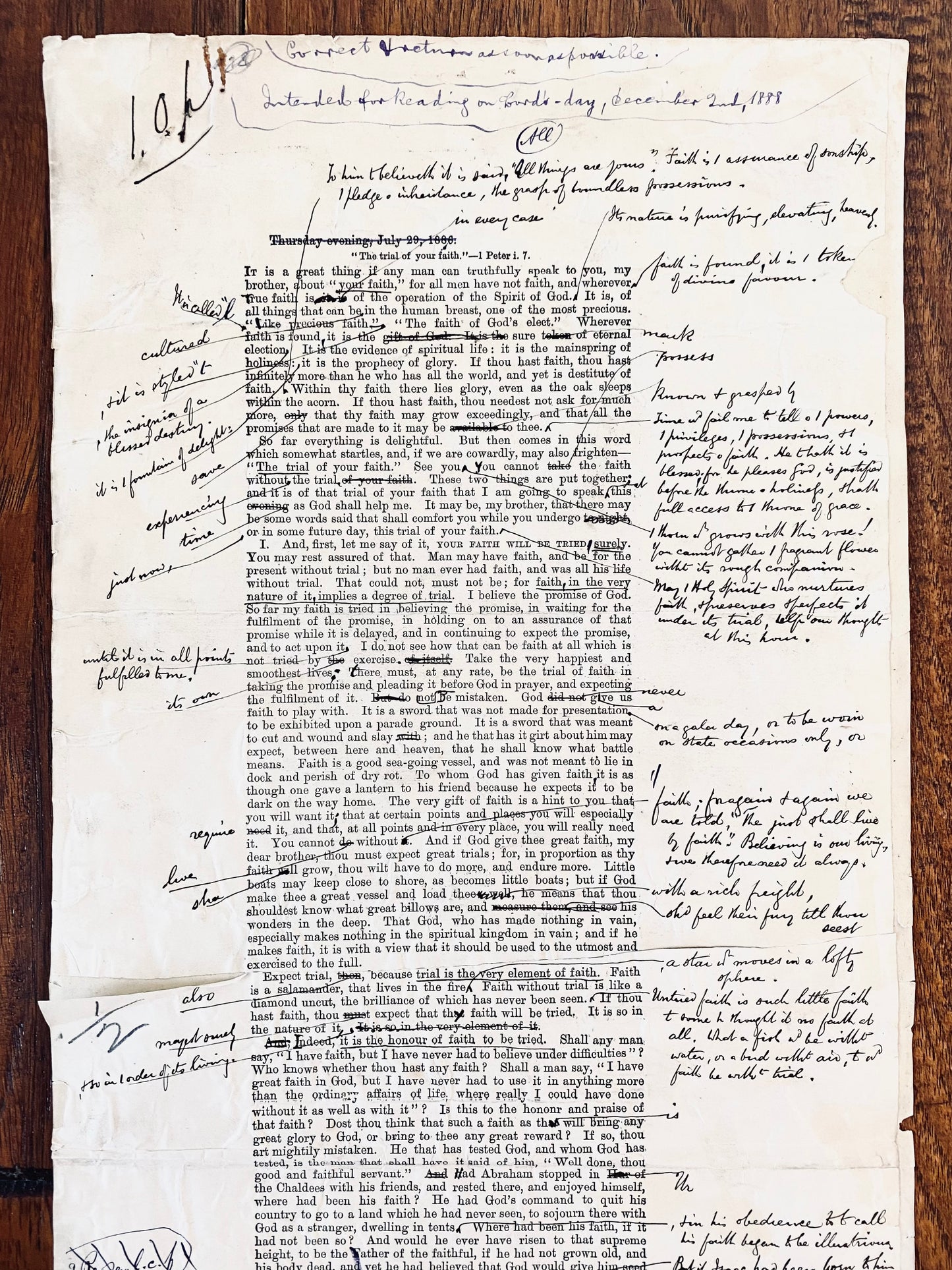Specs Fine Books
1888 C. H. SPURGEON. Autograph Printer's Galleys. The Trial of Faith & the Good of Affliction
1888 C. H. SPURGEON. Autograph Printer's Galleys. The Trial of Faith & the Good of Affliction
Couldn't load pickup availability
Wonderful, attractive piece of Spurgeonalia.
Each Lord's Day, Spurgeon's rhythm was the same. His secretary would take down his sermon long-hand as he preached [which, for many years, was from a simple 4 x 6ish card]. Then, on Monday, he would revise the secretarial transcript in his own hand. This would then be forwarded to Passmore & Alabaster, who would return galley proofs, which would undergo another round of revision.
The present is a complete galley proof, issued to Spurgeon for final revision and having his final corrective notes, in his own hand, throughout the margins as shown. This example was particularly heavily amended, meaning more of Spurgeon's handwriting on each sheet.
These are wonderful displayed! We usually suggest having the first page framed in the front and a second piece of glazing prepared for the rear of the frame where the remaining three can be stored, second sheet first. Any competent framer can take care of that.
Sermon Title: The Trial of Your Faith. I Peter i. 7.
Date: December 2, 1888.
Size: 3.5 sheets as shown; each sheet, appx 8 x 20 inches.
EXTRACTS:
If you walk away from God, and live without fellowship with him, you may retain in your heart much falsehood, and fancy that you are full of spiritual gifts and graces; but if you draw near to God, and walk with him, you will not be able to retain a false opinion of yourself. Remember what the Lord is. Our God is a consuming fire.
. . .
Another trial of faith is exceedingly common and perilous nowadays, and that is, heretical doctrine and false teaching . . . You come across a doctrine which you cannot understand, and because you cannot understand it, you are tempted not to receive it. Or, when a truth which you have received appears to be hard, and speaks to you in an unlovely fashion, so that your natural feelings are aroused against it; this is a trial of your faith.
Remember how our Lord Jesus lost quite a company of disciples on a certain occasion. He had taught a doctrine about eating his flesh and drinking his blood; and from that hour many went back, and walked no more with him, till the Saviour had to say, even to the twelve, “Will ye also go away?”
Truth is not always welcome to our ignorance, or to our prejudice, and herein is a trial of faith. Will we believe ourselves or our God? Do we want to believe God’s truth, or do we wish to have the Lord’s message flavoured to our taste? Do we expect the preacher to play our chosen tunes, and speak our opinions? Beloved, it does us good to be well rasped sometimes; to have a word come to us, not as a sweet wine, but as a purging medicine, that shall search us through and through, and make us enquire before God, “Are we true men, or are we aliens?” If we run in the same line with God’s truth, we are true; but when we run counter to the truth of God, we are ourselves untrue. It is not the Book that is to be altered: our hearts want altering.
. . .
My Lord sometimes comes to me in this fashion. He says, “I have made thee to trust me these many years. I have supplied the wants of thy work by liberal friends. I am about to remove a generous helper.” I go to the grave of my friend, and the suggestion dogs me, “Who is to provide for the Orphanage and the College, after other dear friends are buried? Can you trust God then?” Blessed be the name of the Lord, this fiery trial has never even left the smell of fire upon me; I know whom I have believed. Then a dear brother, our best worker, our heartiest helper, comes to me, and says, “Goodbye, dear Pastor; perhaps I may never see you again on earth.” He is very ill, and about to lie under the surgeon’s knife, and the fear is that he may not rally. I go home, and say to myself, “What shall I do without this useful man?” And then I have to say, “Why, do? Do what I have done before— trust in the living God.” If you once get to walk the walk of faith, the Lord will often try you in this way, to see whether you come up to your own confession— whether you really trust in the Lord, and have your expectation from him alone.
. . .
It will be no child’s play to come under the divine tests. Our faith is not merely jingled on the counter like the shilling which the tradesman suspects, but it is tried with fire; for so it is written, “I have chosen thee in the furnace of affliction.” The blows of the flail of tribulation are not given in sport, but in awful earnest, as some of us know who have been chastened sore, almost unto death. The Lord tries the very life of our faith; not its beauty and its strength alone, but its very existence. The iron enters into the soul; the sharp medicine searches the inmost parts of the belly; the man’s real self is made to endure the trial. It is easy to talk of being tried, but it is by no means so simple a matter to endure the ordeal.
. . .
Come, let us be comforted as to the trial of our faith. There is no hurt in it. It is all for good. The trial of our faith is entirely in the hands of God. Nobody can try us without God’s permission. He will try us just as much as we ought to be tried, and no more. While he tries us with one hand he will sustain us with the other. If he gives us bitters, he will give us sweets in full proportion. A dear sister said to me this week, “When I used to be in poverty and in trouble, the Word of God was much more sweet to me than it is now that I am prospered.” I do not wonder at it. I have made a similar remark when I have been long without an illness. Some of us have cried, “Take me back to my sickness again. Take me back to slander and rebuke again.” A Scotch saint said that when they met in the moss, or by the hill-side, and were harried by Claverhouse and his dragoons, Christ was present at the sacraments in the heather much more than he ever was afterwards when they got into the kirk, and sat down quietly. Our worst days are often our best days, and in the dark we see stars that we never saw in the light. So we will not care a pin what it is that may befall us here, so long as God is with us, and our faith in him is genuine. Christian people, I am not going to condole with you, but I congratulate you upon your troubles, for the cross of Christ is precious.
Share






